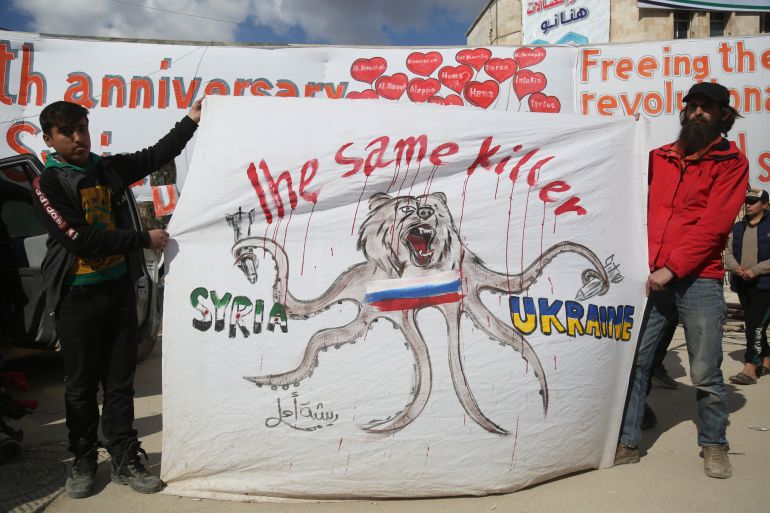Ukrainians and Syrians must stand united against Putin’s Russia
Russia is repeating in Ukraine the atrocities it first committed – and got away with – in Syria.

Russia’s full-scale invasion of Ukraine is hauntingly reminiscent of the conflict in Syria.
As Ukraine’s President Volodymyr Zelenskyy remarked in a recent address, the lack of accountability for Russian war crimes in Syria has led to a sense of impunity, and continues to fuel its current aggression in Ukraine.
Keep reading
list of 4 itemsAustralian war crimes whistleblower David McBride jailed for six years
Will Israel’s war on Gaza sway South Africa’s election?
Masked Tunisian police arrest prominent lawyer for media comments
Indeed, for many Syrians, the post-apocalyptic scenes described by Ukrainians are the worst kind of déjà vu. They include widespread and deliberate attacks on civilians and civilian infrastructure, including hospitals; mass displacement and large-scale destruction. Scenes of people fleeing heavily bombed cities such as Mariupol are reminiscent of the air strikes on Homs, Ghouta and eastern Aleppo.
Despite overwhelming evidence of Russia’s crimes in Syria, none of the perpetrators has been brought to justice, including Russian proxies such as the Wagner Group, which is also wreaking havoc in Africa.
Moreover, while recent developments, such as the indictment of Russian President Vladimir Putin for the mass deportation of Ukrainian children, offer a glimmer of hope for justice, the ongoing violence and geopolitical deadlock run the risk of complicating the process.
In addition, Russia’s relentless manipulation of the war narrative has been as damaging as the war itself. Disinformation and propaganda have already misrepresented the conflict in Syria and are now being used extensively to justify the invasion of Ukraine and deny war crimes.
As highlighted in Amnesty International’s latest assessment on human rights, the events in Ukraine point to a clear failure of the international system to prevent and deal with global crises.
All this makes cooperation and solidarity between victims, humanitarian organisations, and civil society in Syria and Ukraine an urgent necessity. As I examine in a new report for Impunity Watch, this could be an opportunity not only to bring perpetrators to justice but also to expose gaps in the enforcement of international humanitarian law. It can improve processes for documenting violations and crimes, support justice and accountability efforts and enhance advocacy work.
In the past year, there have been a few promising initiatives by Syrian organisations, such as the Syria Justice and Accountability Centre (SJAC), Syria’s White Helmets, and the Union of Medical Care and Relief Organisations (UOSSM), to share experiences with their counterparts in Ukraine.
One inspiring example of collaboration comes from the Syria Archive, a Syrian-led project set up to preserve digital evidence of human rights violations, who have teamed up with Ukrainian activists to create the Ukraine Archive to document violations in that country.
These efforts must be developed and scaled up both at a grassroots and higher levels. The international community could play an important role by supporting Syrian and Ukrainian humanitarian and human rights actors to meet regularly, exchange experiences, and develop strategies.
The success of any justice and accountability efforts crucially depends on victims’ active and meaningful participation. One such forum could therefore bring together Ukrainian victims and survivors of gross human rights abuses with Syrian victim associations, who have been particularly successful in coming together and mobilising support in their fight for justice.
Syrian and Ukrainian civil society organisations could jointly campaign for changes in practices and regulations to ensure adequate and dignified protection for people affected by war.
For example, Russia’s misuse of humanitarian corridors in both Ukraine and Syria is an ominous example that should be scrutinised closely. The safe passages that were supposed to save lives have been weaponised to win military victories and re-engineer the demographics of certain areas. The impacts of these corridors must be carefully examined with a more transparent, impartial, and broader legal and human rights perspective.
Another important lesson from Ukraine and Syria is for healthcare protection in times of armed conflict. Although international humanitarian law provides a robust legal framework to protect healthcare, attacks on facilities, personnel and patients continue. Turning a blind eye to such attacks in Syria and many other wars in the past has allowed unnecessary and unimaginable suffering in Ukraine today.
These atrocities are well documented. The ball is now in the court of UN bodies, international law enforcement agencies, and the International Committee of the Red Cross as custodians of international humanitarian law Geneva Conventions.
Ultimately, the efforts of the World Health Organization to document attacks on healthcare cannot be underestimated. However, these efforts will remain insufficient until the perpetrators of such attacks are expressly identified and named.
Bringing perpetrators to justice is not simply an imperative for Syria or Ukraine. It is a universal dream of victims, affected communities, human rights defenders and medical providers in conflict-affected settings.
The bitter lessons of Syria and now Ukraine must finally be put into practice to prevent more deja vus in the future.
The views expressed in this article are the author’s own and do not necessarily reflect Al Jazeera’s editorial stance.
